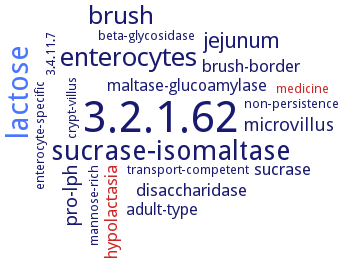3.2.1.62: glycosylceramidase
This is an abbreviated version!
For detailed information about glycosylceramidase, go to the full flat file.

Word Map on EC 3.2.1.62 
-
3.2.1.62
-
lactose
-
sucrase-isomaltase
-
enterocytes
-
brush
-
jejunum
-
pro-lph
-
microvillus
-
brush-border
-
sucrase
-
hypolactasia
-
disaccharidase
-
adult-type
-
maltase-glucoamylase
-
enterocyte-specific
-
mannose-rich
-
beta-glycosidase
-
transport-competent
-
3.4.11.7
-
medicine
-
non-persistence
-
crypt-villus
- 3.2.1.62
- lactose
- sucrase-isomaltase
- enterocytes
-
brush
- jejunum
-
pro-lph
- microvillus
-
brush-border
- sucrase
- hypolactasia
- disaccharidase
-
adult-type
- maltase-glucoamylase
-
enterocyte-specific
-
mannose-rich
-
beta-glycosidase
-
transport-competent
-
3.4.11.7
- medicine
-
non-persistence
-
crypt-villus
Reaction
Synonyms
cerebrosidase, EGC, EGCII, EGCrP1, Egh1, endo-glycoceramidase II, endoglycoceramidase II, endoglycoceramidase-related protein 1, ergosteryl-beta-glucosidase, Gcase, glucocerebrosidase, glycosyl ceramide glycosylhydrolase, glycosyl-N-acylsphingosine glycohydrolase, glycosylceramidase, KLotho lactase phlorizin hydrolase, Klotho-related protein, lactase phlorizin hydrolase, lactase-phlorizin hydrolase, LCT, LPH, LPH1, phloretin-glucosidase, phloridzin glucosidase, phlorizin beta-glucosidase, phlorizin hydrolase, Yir007w
ECTree
Advanced search results
Engineering
Engineering on EC 3.2.1.62 - glycosylceramidase
Please wait a moment until all data is loaded. This message will disappear when all data is loaded.
D1711N
G1363S
-
the mutant protein is malfolded and enzymatically inactive and can not exit the endoplasmic reticulum. The mutation creates an additional N-glycosylation site that is characteristic of a temperature-sensitive protein. The potential glycosylation site generated by the mutation is not the cause of defective trafficking of LPH-G1363S or its reduced enzymatic activity. Intracellular transport and enzymatic activity, but not correct folding are partially restored by expression at 20°C. The mutant is responsible for an increased turnover rate
G1363S/N1361A
-
eliminates the N-glycosylation site, does not restore the features of wild-type LPH
I1697N
P1743S
D311Y
additional information
-
introduction of a glycosylation site, reduced transport rate to the plasma membrane
D1711N
-
introduction of potential N-glycosylation site, no enzymic activity, probably due to altered protein folding pattern and reduced dimerization efficiency
-
introduction of a glycosylation site, reduced transport rate to the plasma membrane
I1697N
-
introduction of potential N-glycosylation site, no enzymic activity, probably due to altered protein folding pattern and reduced dimerization efficiency
-
introduction of a glycosylation site, reduced transport rate to the plasma membrane
P1743S
-
introduction of potential N-glycosylation site, no enzymic activity, probably due to altered protein folding pattern and reduced dimerization efficiency
Rhodococcus sp. M-777
the mutant enzyme is characterized by a lowered KM value for the hydrolysis of 2-chloro-4-nitrophenyl beta-cellobioside and increased transglycosylation when using aliphatic 1,3-diols or alcohols bearing a delta-hydroxy ketone function as acceptors. The transglycosylation/hydrolysis ratio in reactions catalyzed by the mutant is completely inversed and weak secondary hydrolysis is postponed, thus providing the basis for high transglycosylation yields (between 68 and 93%)
D311Y
Rhodococcus sp. M-777
the mutant shows increased catalytic efficiency for the hydrolysis of 2-chloro-4-nitrophenyl beta-cellobioside compared to the wild type enzyme. The transglycosylation ability of the mutant is improved in comparison to the wild type enzyme
-
loop-out mutagenesis and construction of deletion or individual domain forms of LPH. Removal of domain IV, which contains lactase, results in a diminished phlorizin hydrolase activity, lack of dimerization in the endoplasmic reticulum, but accelerated transport kinetics from the endoplasmic reticulum to the Golgi apparatus. By contrast, deletion of domain III, which harbors phlorizin hydrolase, generates a malfolded protein that is blocked in the endoplasmic reticulum. Transport kinetics and enzyme activity of LPH and deletion mutants differ
additional information
-
the naturally occurring polymorphism T13910C, i.e. rs4988235, causes lactose intolerance in the C-variant, associated with lower dietary calcium intake and serum calcium levels but not with BMD or fractures. Genotyping and phenotype, overview. The polymorphism is not associated with the genetic variations in the VDR gene, and no interactions between the two genotypes
additional information
removal of domain I (LPHDELTA1) results in a malfolded ER-localized protein. Enzyme without domain II (LPHDELTA2) is normally transported along the secretory pathway, but does not dimerize nor is enzymatically active. The lactase activity is not detectable in LPHDELTA1 and LPHDELTA2. Phlorizin hydrolase activity is only detectable in LPHDELTA2, albeit at substantially reduced levels of 4.3%


 results (
results ( results (
results ( top
top






